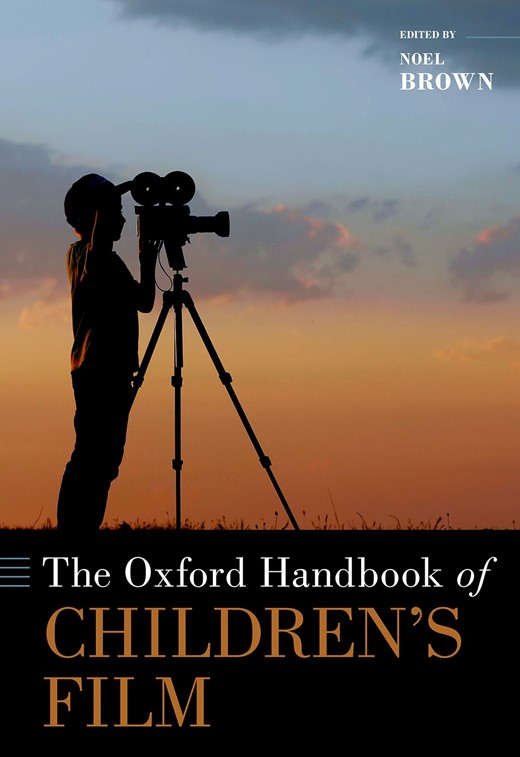 The Oxford Handbook of Children's Film
The Oxford Handbook of Children's Film
Contents
-
-
-
-
-
-
-
-
The Child-Centred Film as Experiential Modernism The Child-Centred Film as Experiential Modernism
-
Chaplin’s The Kid as Prototype Chaplin’s The Kid as Prototype
-
The Cop as Signifier of the Urban The Cop as Signifier of the Urban
-
The Kid as Troublemaker The Kid as Troublemaker
-
The Cop as Comedic Foil The Cop as Comedic Foil
-
The Cop as Benevolent The Cop as Benevolent
-
The Cop as Immigrant The Cop as Immigrant
-
Conclusion Conclusion
-
Notes Notes
-
Bibliography Bibliography
-
-
-
-
-
-
-
-
-
-
-
-
-
-
-
-
-
-
7 The Cop and the Kid in 1930s American Film
Get accessPamela Robertson Wojcik is Professor and Chair of the Department of Film, TV and Theatre at the University of Notre Dame. She is most recently author of Gidget: Origins of a Teen Girl Media Franchise (Routledge 2021) and Fantasies of Neglect: Imagining the Urban Child in American Film and Fiction (Rutgers University Press 2016) and co-editor of Media Crossroads: Intersections of Space and Identity (Duke University Press 2021).
-
Published:20 April 2022
Cite
Abstract
This chapter examines some of the numerous moments in 1930s films when kids encounter the police. In films starring the Dead End Kids, Shirley Temple, Jane Withers, Jackie Cooper, kids are seen freely wandering urban streets, having encounters with adults, and frequently running into the police. Rather than treat the children as innocents who need protection from the streets, these films view kids as miscreants and troublemakers; their presence on city streets taken for granted, but not welcome. These narratives trouble traditional notions of childhood by representing children as tough, street-smart, experienced, and not tethered to family or institutional life. At the same time, they offer a different view of police, showing them as neither wholly benevolent nor as threats, but as largely ineffectual figures. Crucially, they show cops and kids as adjacent figures in the public sphere, mutually aware of each other and in frequent contact.
Sign in
Personal account
- Sign in with email/username & password
- Get email alerts
- Save searches
- Purchase content
- Activate your purchase/trial code
- Add your ORCID iD
Purchase
Our books are available by subscription or purchase to libraries and institutions.
Purchasing information| Month: | Total Views: |
|---|---|
| October 2022 | 4 |
| November 2022 | 2 |
| December 2022 | 2 |
| January 2023 | 5 |
| February 2023 | 4 |
| March 2023 | 4 |
| April 2023 | 7 |
| May 2023 | 2 |
| June 2023 | 2 |
| July 2023 | 2 |
| August 2023 | 6 |
| September 2023 | 5 |
| October 2023 | 2 |
| November 2023 | 2 |
| December 2023 | 3 |
| January 2024 | 2 |
| February 2024 | 1 |
| March 2024 | 5 |
| April 2024 | 2 |
| May 2024 | 9 |
| June 2024 | 8 |
| July 2024 | 1 |
| January 2025 | 2 |
| February 2025 | 2 |
| March 2025 | 1 |
| May 2025 | 1 |

Get help with access
Institutional access
Access to content on Oxford Academic is often provided through institutional subscriptions and purchases. If you are a member of an institution with an active account, you may be able to access content in one of the following ways:
IP based access
Typically, access is provided across an institutional network to a range of IP addresses. This authentication occurs automatically, and it is not possible to sign out of an IP authenticated account.
Sign in through your institution
Choose this option to get remote access when outside your institution. Shibboleth/Open Athens technology is used to provide single sign-on between your institution’s website and Oxford Academic.
If your institution is not listed or you cannot sign in to your institution’s website, please contact your librarian or administrator.
Sign in with a library card
Enter your library card number to sign in. If you cannot sign in, please contact your librarian.
Society Members
Society member access to a journal is achieved in one of the following ways:
Sign in through society site
Many societies offer single sign-on between the society website and Oxford Academic. If you see ‘Sign in through society site’ in the sign in pane within a journal:
If you do not have a society account or have forgotten your username or password, please contact your society.
Sign in using a personal account
Some societies use Oxford Academic personal accounts to provide access to their members. See below.
Personal account
A personal account can be used to get email alerts, save searches, purchase content, and activate subscriptions.
Some societies use Oxford Academic personal accounts to provide access to their members.
Viewing your signed in accounts
Click the account icon in the top right to:
Signed in but can't access content
Oxford Academic is home to a wide variety of products. The institutional subscription may not cover the content that you are trying to access. If you believe you should have access to that content, please contact your librarian.
Institutional account management
For librarians and administrators, your personal account also provides access to institutional account management. Here you will find options to view and activate subscriptions, manage institutional settings and access options, access usage statistics, and more.